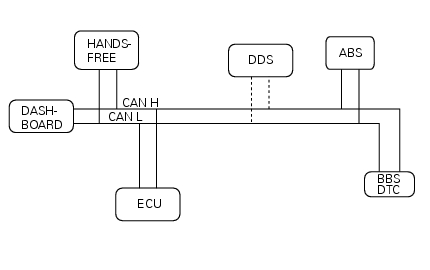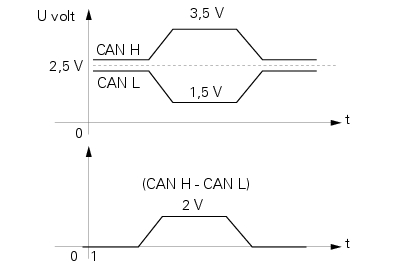
Ducati Diavel Service Manual: On-board computers and the can line
The following on-board computers make up the electrical system of the diavel and are connected with each other via the can line (or network):
- Master dashboard
- Slave dashboard
- Hands free (facilitated keyless start system)
- Ecu (engine control unit)
- Bbs (black box system or central electronics with integrated dtc traction control system.
- Abs (antilock braking system).

The drawing illustrates the network connecting the different computers ('nodes') on the diavel. The dtc system is not a separate unit and is integrated in the bbs.
The main characteristics of the computers used on the diavel are described as follows:
- The (master and slave) dashboard units not only display specific information of use to the rider, but are also connected to the sensors and actuators installed on the motorcycle. These units make the information received from the sensors available over the network and control the actuators, also in response to orders received from other computers connected to the network. The units' service displays also visualise any vehicle electronic system faults
- The hands free unit allows the rider to start the engine without
inserting a conventional key into the ignition switch.
This makes starting the motorcycle easier and quicker. The system also offers increased theft protection
- The ecu manages the functions of the engine and also controls the ride by wire system. The ride by wire system modulates throttle valve aperture via an electric actuator coordinated by the ecu. The ecu receives a "torque demand" signal from a potentiometer linked to the throttle grip. Three different throttle valve aperture regimens are stored in the ecu, which make different maximum power values and different torque curves possible.
- Like the dashboard units, the bbs is connected to sensors and actuators installed on the vehicle. The unit makes the information received from the sensors available over the network and controls the actuators, also in response to orders received from other computers connected to the network. It also has another fundamental function, as it gathers all the errors registered by the other computers due to specific faults. The software in the bbs also performs the dtc function, which regulates engine torque delivery to prevent wheelspin under acceleration.
The networked connection of the individual computers (nodes) creates a distributed system in which the nodes may communicate with one another and coordinate their actions by exchanging messages. This offers the following advantages:
- A distributed system needs less sensors, substantially simplifying the electrical system, as information provided by certain sensors may be shared, rendering it unnecessary to provide duplicate sensors for each node.
- Each node is capable of complex control functions on the basis of the information received from the other nodes connected to the network
- Reducing the number of connections and electrical wires makes the system more reliable.
The network allowing communication between the different nodes on the diavel is a serial (bus) type can (controller area network) network. Each node contains a circuit that can transmit and receive data to and from the network in accordance with priorities defined by specific bits included within the data itself (the message travelling over the network is always the one with the highest priority). As a result, the can bus network does not need to be managed with a specific centralised arbitration procedure that defines the priorities with which the elements connected to the network must communicate.
Each message travelling over the can network consists of a "train" of electrical impulses containing, as mentioned previously, the priority - in other terms the type of message - the data itself, the confirmation of reception and other data necessary for correct transmission and reception. The train of impulses is transmitted to the bus, which consists of two wires - can h and can l. Each node extrapolates the message and, as a result, the data contained, processing the Sequences of impulses received from on the can h and can l wires independently. This ensures superior reliability, as any interference in the electrical signals is effectively subtracted and eliminated.

One drawing shows the typical voltages on the can h and can l wires for each electrical impulse contained in the train "transporting" information shared by the nodes connected to the network. The other drawing shows the signal extrapolated by each node from the difference between the two former signals.
In short, the advantages of using the can bus are as follows:
- Only two wires are used (can h and can l)
- The architecture of the network independent from the configuration of the system or, in other terms, the number of nodes (computers) connected to the network itself
- The network is highly fault-tolerant
- The network is capable of handling node errors and/or faults effectively
- The network ensures reliable message delivery times by applying a priority system
Note that the control function for the electrical impulses travelling over the can network has no validity for diagnostic purposes, as the information contained in the trains themselves cannot be identified.
 Fault indication
Fault indication
The dds (diagnosis ducati system) indicates all active errors and all
inactive but stored errors gathered by the bbs. A
simplified summary of the active errors is also shown in the master dashboard ...
Other materials:
Disassembly of the generator cover
Undo the three stator retaining screws (25) and the two retaining screws (9)
of the two cable grommet bracket (10) from
inside the generator cover.
Remove the stator (2) and the cable grommet bracket (10).
The generator-side crankcase cover is fitted with a bearing (27), held in
pla ...
Engine start button
Introduction
The engine start button is located on the right hand handlebar switchgear set
and is used to turn the engine on.
Component assembling position
The engine start button is included in the switchgear set on the right hand
handlebar.
Location of right hand handlebar switchge ...
Communication antenna
Introduction
The communication antenna enables the hands free system to detect and
communicate with the active or passive key.
The active key is detectable within a range of 1.5 Metres, whereas the passive
key (or active key with flat battery) can
only be detected if placed in contact with ...
